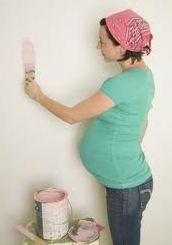March 13th, 2011 by Linda Burke-Galloway, M.D. in Better Health Network, Health Tips
No Comments »

 I came across an article the other day about paint and pregnancy. Yes, that paint — the kind that you put on a canvas or slap on your walls. Did you know that paint is made of pigment particles in a liquid base called a medium? Oil paints are thinned or cleaned with paint thinners. Latex paints are thinned or cleaned with water. Most paint that’s used in the home is latex.
I came across an article the other day about paint and pregnancy. Yes, that paint — the kind that you put on a canvas or slap on your walls. Did you know that paint is made of pigment particles in a liquid base called a medium? Oil paints are thinned or cleaned with paint thinners. Latex paints are thinned or cleaned with water. Most paint that’s used in the home is latex.
Can environmental forces affected pregnancy? The short answer is “yes,” according to the Organization of Teratology Information Specialists (OTIS), whose mission is to study malformations of the unborn.
Regarding paint and pregnancy, the amount of exposure is important. A one-time household exposure causes fewer problems than ongoing exposure through a work setting. And there have been medical studies documenting babies being born with problems if their mothers abused toluene-containing paint in order to “get high.” Toluene is a paint thinner that can cause low birth weight, premature labor, small head size, and developmental delays. Again, these problems only occur if pregnant women have been exposed to very high levels of toluene — much higher levels than exposure based on a hobby or a professional painter.
According to OTIS, working as a painter doesn’t pose concrete risks to the pregnancy. However, any reduction in chemical exposure is always a good thing. Read more »
*This blog post was originally published at Dr. Linda Burke-Galloway*
February 24th, 2011 by Linda Burke-Galloway, M.D. in Health Tips, Research
No Comments »

 Birth defects, particularly those of the blood vessels, account for the majority of infant deaths, especially after the first week of life. Congenital heart disease (CHD) — meaning defects of the heart — is responsible for one-third of deaths between birth and the first year of life. Therefore, the diagnosis of CHD is critical in order to plan life-saving treatments, such as the proper place for the delivery, the type of delivery, and its timing. If it’s known in advance that an unborn baby has a heart problem and is delivered in a hospital that provides special care, its survival and future health will increase dramatically.
Birth defects, particularly those of the blood vessels, account for the majority of infant deaths, especially after the first week of life. Congenital heart disease (CHD) — meaning defects of the heart — is responsible for one-third of deaths between birth and the first year of life. Therefore, the diagnosis of CHD is critical in order to plan life-saving treatments, such as the proper place for the delivery, the type of delivery, and its timing. If it’s known in advance that an unborn baby has a heart problem and is delivered in a hospital that provides special care, its survival and future health will increase dramatically.
Who’s at risk for having CHD and which expectant moms should have further evaluation? Families who have a history of CHD — especially mothers, fathers, and siblings — should receive genetic counseling. Multiple medical studies over the past fifteen years have demonstrated the significance of genetics as a main culprit of CHD. Parents of a child with CHD have a two percent to three percent chance of having another affected child. If a mother or father has CHD, a fetal cardiac echo (an ultrasound of the heart) is definitely warranted.
Because the treatment of CHD in many cases is surgical, there’s an increasing number of patients who have survived into adulthood and have ultimately become parents. Research has documented that 4.1 percent of their children will have CHD. Children with mothers who have CHD are at a greater risk of inheriting the disease than if they have fathers with CHD. Mothers with cyanotic heart disease — that is, blood that is without oxygen that bypasses the lungs and goes directly to the blood vessels — also have a greater risk of having a baby with CHD. Read more »
*This blog post was originally published at Dr. Linda Burke-Galloway*
February 9th, 2011 by IsisTheScientist in Opinion, Research
No Comments »

 I can already tell that this pregnancy is different from my first. When I was pregnant with Little Isis, I drank no caffeine and took no over-the-counter medication. I remember having a few headaches and Mr. Isis fighting with me to take a headache pill. I would then proclaim dramatically, “But I can’t! What if it hurts the baby?!”
I can already tell that this pregnancy is different from my first. When I was pregnant with Little Isis, I drank no caffeine and took no over-the-counter medication. I remember having a few headaches and Mr. Isis fighting with me to take a headache pill. I would then proclaim dramatically, “But I can’t! What if it hurts the baby?!”
This morning, now pregnant with my second, I washed down a Zyrtec and two Tylenol with a cup of coffee. The little bugger is going to have to grow up with Little Isis. He might as well start building up his tolerance to exogenous substances at some point. I figure, now that its got a closed neural tube and a beating heart, we might as well begin.
Still, you can’t blame a pregnant woman for being a bit neurotic. The feeling that one is solely responsible for the well-being of a developing creature, combined with often contradictory advice, is enough to make anyone nuts. Most online advice is completely and utterly useless. Take this answer from Russell Turk, M.D. on the popular pregnancy website BabyCenter in response to the common question, “Is it safe to drink diet soda during pregnancy?” He answers:
Diet sodas often contain both caffeine and an artificial sweetener. There are several types of artificial sweeteners you may see on nutrition labels:
Aspartame (NutraSweet): Seems to be okay when consumed in moderation (the amount found in one or two 12-ounce servings of soda per day).
Saccharin (Sweet’n Low): Saccharin was found to cause birth defects in laboratory rats when consumed in very high amounts. Because its safety in smaller amounts is hard to prove, I would advise avoiding it.
Sucralose (Splenda): This relatively new sweetener, a modified form of regular table sugar, appears to be safe. But because it hasn’t been extensively studied, it’s best used in moderation.
It’s generally bad advice and leaves one wondering: “What is moderation? Will one soda hurt my baby? Will two sodas hurt my baby? How about three?” The default answer when we don’t know seems to be to tell women to do things in “moderation.” This places the sole responsibility on her to know what moderation means, and allows her to feel the guilt if something goes wrong. I think that these imprecise answers leave many women feeling helpless and afraid. Read more »
*This blog post was originally published at The Brain Confounds Everything*
February 7th, 2011 by Toni Brayer, M.D. in Health Tips, News
No Comments »

 The Canadian Medical Association Journal (CMAJ) has published a new primer designed to help physicians when they counsel pregnant women. They note that sex during pregnancy is normal and is generally considered safe. The authors point out that there are very few proven contraindications and risks regarding intercourse in normal pregnancy.
The Canadian Medical Association Journal (CMAJ) has published a new primer designed to help physicians when they counsel pregnant women. They note that sex during pregnancy is normal and is generally considered safe. The authors point out that there are very few proven contraindications and risks regarding intercourse in normal pregnancy.
Pregnant women and their partners are often afraid to have sex. Men may think they are “invading” the home of the fetus and could actually harm the baby. In fact, the fetus is quite safe, ensconced in the uterus (womb) and the cervix (opening of the uterus) is closed in normal pregnancy. The penis has no contact with the fetus or the uterus during normal intercourse, no matter what the position.
When is intercourse considered risky? Only for women who are at high risk for preterm labor and for those with placenta previa because there is increased risk for hemorrhage. Even women who have had preterm labor may safely have sex unless they have cervical incompetence or a lower genital tract infection.
Women who are under the care of an obstetrician should know if they have any of these risks. The vast majority of women should be reassured that sex during pregnancy is safe for mom and baby.
*This blog post was originally published at EverythingHealth*
January 27th, 2011 by Linda Burke-Galloway, M.D. in Health Tips, Opinion
No Comments »

 The journey to a healthy pregnancy and delivery begins with the selection of a healthcare provider, and the challenge is to find the right one. This is the person who will be in charge of your pregnancy up until the time of the delivery, so it certainly is not a casual date. For the next 280 days your life and the life of your unborn child will be in this person’s hands. A background check is therefore in order.
The journey to a healthy pregnancy and delivery begins with the selection of a healthcare provider, and the challenge is to find the right one. This is the person who will be in charge of your pregnancy up until the time of the delivery, so it certainly is not a casual date. For the next 280 days your life and the life of your unborn child will be in this person’s hands. A background check is therefore in order.
One of the best ways to find the right healthcare provider is by word-of-mouth referral from neighbors, friends, or family members however please don’t stop there. Labor and delivery nurses are also a great source of referral because they have seen physicians and midwives under their most vulnerable and challenging moments.
Don’t feel intimidated about checking a provider’s credentials — this is public information. You can find out whether the provider’s medical license is current or expired. You’ll also be able to obtain information on whether the provider has ever been disciplined by the board for medical malpractice or unprofessional behavior or misconduct. Healthcare providers are not exempt from problems with alcoholism, drug addiction, professional incompetence, and unprofessional or unethical behaviors. Although less than five percent of healthcare providers have egregious problems, you want to make certain that your provider is not one of them. Read more »
*This blog post was originally published at Dr. Linda Burke-Galloway*
 I came across an article the other day about paint and pregnancy. Yes, that paint — the kind that you put on a canvas or slap on your walls. Did you know that paint is made of pigment particles in a liquid base called a medium? Oil paints are thinned or cleaned with paint thinners. Latex paints are thinned or cleaned with water. Most paint that’s used in the home is latex.
I came across an article the other day about paint and pregnancy. Yes, that paint — the kind that you put on a canvas or slap on your walls. Did you know that paint is made of pigment particles in a liquid base called a medium? Oil paints are thinned or cleaned with paint thinners. Latex paints are thinned or cleaned with water. Most paint that’s used in the home is latex.















